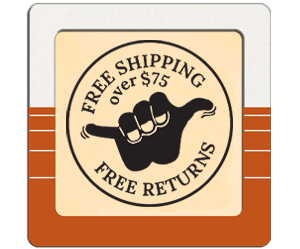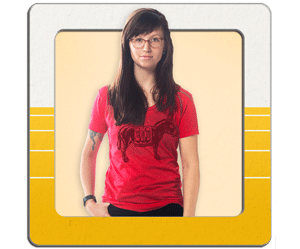Shop
Free US Shipping Over $75 + Free Returns → To The Tees
Free Shipping $75+ • Free Returns • To The Tees

20 Big Insights from 20 Years in Small Business
November 26, 2021 8 min read
This year marks the 20th anniversary of Solid Threads. Two decades digging in the same hole. I've hit a lot of rocks, but I’ve become much more comfortable in the dirt along the way.
Running a small business is not for the faint of heart. It’s dirty work. Emotionally messy, physically toiling, and psychologically fraying. But with great adversity comes immense opportunity for growth, healing, and fulfillment at the deepest levels.
In that spirit, I felt inclined to share 20 of my biggest insights from 20 years in small business. My list is a mix of the practical and the spiritual, shared with the intention of sharpening your entrepreneurial tack (for any endeavor) by way of softening into your self-understanding and agency.
Many of the underlying concepts are not original to me, but a distillation of ideas and lessons that have impacted me most on this small business journey. I offer them in gratitude, sincerity, and in my own Head T-shirt Guy flavor.

#1. Do one thing really well.
Dig your hole narrow and deep, instead of shallow and wide. By focusing on our core calling, we pave the way for a level of expertise in our craft that compounds over time and cuts through the noise of the crowd.

#2. Base decisions on broad strokes.
Broad strokes make up the big beautiful background colors that hold space for the details to shine through. Hone in on the trajectory of your underlying aspirations and practice making bold moves on behalf of this deeper understanding. Recognize where and how the “paralysis of analysis” creeps in to hamper your decision-making process, and bring your attention back to the foundational level. A cool thought experiment to support this aim is to picture yourself 3 - 5 years in the future, crystallize a vision of exactly how you want your life and business to be, and then ask yourself, “What decisions did I make to get here?”

#3. Don’t let the tail wag the dog.
Learn to recognize the ways you justify the means in service of some end. Chasing who you want to be in the future at the expense of who you are now is one of the sneakiest of self-sabotaging traps. If and when statements like, “I’ll stop overworking WHEN I have this much money,” or, “I’ll be worthwhile IF I attain this level of recognition,” are spokes in the hamster wheel of our self-delusions that disconnect us from the source wisdom of the here and now.

#4. Choose your weather windows wisely.
The more aware you are of your surroundings at any given moment, the more able you are to adjust course according to the present circumstances, and arrive at your goals more efficiently. Walking gently in the right direction is much better than pushing too hard in the wrong one.

#5. Expect the unexpected.
Things do not often go as planned. Our ability to embrace these so-called setbacks and cultivate new ways of framing them is the key ingredient of resilience. The receptivity and resourcefulness needed to adapt to adversity is more readily available to us when we fully appreciate that uncertainty is the only certain thing in this world.

#6. Our thoughts make us.
Thoughts are literal pulses of energy that can be measured and have tangible effects. Appreciating their power and expanding our awareness of our inner dialogue are integral to becoming who we want to be. Journaling every day or writing our “Morning Pages,” as Julia Campbell expounded in her miraculous little book, The Artist Way, is a rewarding approach for charting the topography of our subconscious patterns. Our brains are tools that should be used at our discretion as opposed to blindly following their lead without our conscious consent.

#7. Find your purpose… patiently.
The phrase "find your purpose" has been overused to the point where its lost a lot of its power. It helps to think of it more as an alignment of your actions with your passions so your work can take on more meaning for you. Following the work that makes us feel good and asking ourselves why, is a simpler approach to finding your purpose. Infusing meaning into your work is the single most important ingredient towards creating something greater than the sum of its parts and tapping your fullest potential.

#8. Experiment all the time.
Entrepreneurship is rooted in inspiration - the inexplicable, energizing spark of creativity and adventure found within the openness of the unknown. It’s easy to fall back onto what’s proven, or worse yet, to take a rigid stance in protecting what we have already gained. Be careful to rely too heavily on that which can be measured, at the expense of what you do not yet know. A willingness to cut ties with old ways of doing things, and let go of longstanding conventions, is crucial to sustainable growth.

#9. Giant leaps are taken in tiny steps.
Bill Gates said it best. “Most people overestimate what they can do in one year and underestimate what they can do in ten.” Break down huge goals into small stages that can be incrementally acted upon, so the overwhelm of huge undertakings does not prevent you from ever making a start. Setting big hairy audacious goals (or "BHAG" from the book Built to Last) and allocating small chunks of time to them consistently is how things that we never thought were possible become a reality.

#10. Believe in yourself instead of needing to prove something.
When we need external validation to prove we're good enough, it often means we don't believe we're good enough as we are. In order to get what we want, we must first let the universe know that we want it. This begins by opening more fully to our desires and practicing to believe that we are worthy. A simple exercise to facilitate this, is a morning practice of sitting quietly for as a few as 10 deep breaths (and more as you go) at the start of each day and then envisioning not only how you want to interact with the world, but more importantly what it actual feels like in your body to do so. By instilling this understanding in our conscious awareness on a regular basis, we are telling the world that we are ready to receive. Or as Jesus said more succinctly, "Ask and you shall receive."

#11. Write how you talk.
Cultivating an authentic voice for your business and sharing your story in a transparent, engaging way is how we find our 1000 “true” fans. That’s all we need to support our small enterprise (as Kevin Kelly coined and Seth Godin described more fully in his book Tribes). There are now more ways than ever to connect with people, but the written word is a potent vehicle that many people underestimate and are afraid to fully harness. The simple act of speaking what you’re trying to say out loud as you write, is an easy trick to remove the fear around this age old act of expression, making it more enjoyable and ultimately allowing for a more original, honest voice to come through.

#12. To feel is to heal.
As humans, we’re predisposed to avoid pain. Much of the pain we carry within us was inherited and absorbed before we ever even knew what to do with it. So we find ways to suppress and avoid the pain until we get so good at it, there's no longer enough room to see just how ingrained our coping mechanisms have become. This is the crux of addiction. Opening to the physical sensations of this pain in our body is the only way we can release and integrate this darkness into the light, and become whole. This is not the most enjoyable process. There's a reason why we came to avoid this pain in the first place. But becoming aware of our numbing patterns and expanding our capacity for discomfort is the only way we can ever truly heal. Some self-care practices that have most helped me break down these walls around my heart are journaling, therapy, meditation, music, and time in nature.

#13. Discipline frees us.
Cultivating more space in our lives, counterintuitively requires boundaries to be built. Boundaries protect our time for self care and make way for a steadier approach to our work and life. Saying "no" to someone else is saying "yes" to yourself. Fence building and structure in our lives empowers us to take on greater challenges with less effort, ultimately opening up more freedom for us to enjoy.
#14. Learn to hack your habits.
Understanding how habits take root better equips us to let the bad ones go and invite the good ones in. Will power alone is often not enough to change our habits. The way to do this is by associating our habits with other "triggers" so to speak. Establish the framework of doing certain things on certain days, and take actions in conjunction with things you already do. For example, before I shower, I'm going to meditate for 10 minutes or every Tuesday & Thursday, I'm going to work out. The act of association adds accountability, making it harder to excuse when it falls away. While piggybacking the new behavior with one that's already ingrained dramatically increases the likelihood of establishing positive new habits and overwriting negative ones.

#15. If it’s not a hell yes, it’s a hell no.
It’s a lot better to be all in on too few things, than to be halfhearted on too many. As Steve Jobs would say, “People think focus means saying yes to the thing you've got to focus on. But that's not what it means at all. It means saying no to the hundred other good ideas that there are.” This clever turn of phrase between "hell yes" and "hell no" forces us to confront decisions about how we should allocate our time more honestly, so we dedicate our efforts towards things that excite us most. Paul Graham said it another way, "It's hard to do a really good job at anything you don't think about in the shower."

#16. Failure is just a way of learning how to do things right.
Failure gets a bad rap. It’s something we’ve all been unwittingly admonished to avoid at all costs, to the point that it often prevents us from trying. Even a hall of fame baseball player only gets a hit 1 out of 3 times. Reframing “failure” as a vehicle for growth lightens the heaviness around this dreaded notion. After all, the distance between our biggest failures and our deepest aspirations is the most nutrient rich ground we’ll ever cover.

#17. Marketing is not an ancillary function, it is the heart of the machine.
Marketing is often relegated to a side role within many companies or allocated some small slice of the overall budget. This is particularly true in small business. Who has time to promote, when you’re just trying to keep up with core operations? While that may be true at certain intervals, honing our voice, values, and operational systems within the context of the conversation we're having with our customers is the springboard to a better approach in all areas of our business. In this way, marketing should be the starting point of our entrepreneurial efforts, much more than the end.

#18. Delegation is not optional.
Building a culture and team we can trust so we can relinquish control is the only way to sustainably grow. Empowering staff with the tools they need to be successful is essential. Establishing clear processes for all core functions of your business, based upon repeatable systems streamlined into instruction manuals is one of the most important tools we can create. Without a baseline for how we want things done and a means to establish these systems, we can never fully let go.

#19. Persistence is key.
It takes time to get good at anything, including how to run a business. Success is more a process of outlasting failure than it is reaching some “we made it” destination. The trick is staying around long enough to get good at it. The idea that we should have it all figured out from the start, and never make any mistakes, is a false narrative. The main reason the most “successful” entrepreneurs have gotten to where they are is because they’ve been doing it for a long time.

#20. Give as much as you receive.
Instead of thinking about what you’re trying to get from people, and how best to obtain that, think about what you can give them. Consider how you can better take care of your customer’s needs across all touchpoints of your business. Share valuable ideas and content in your marketing as much as you try and sell. Give back in some meaningful way with your profits. Treat people how you would want to be treated in your communication and they will go out of their way to share and support your endeavor.
Leave a comment
Comments will be approved before showing up.






